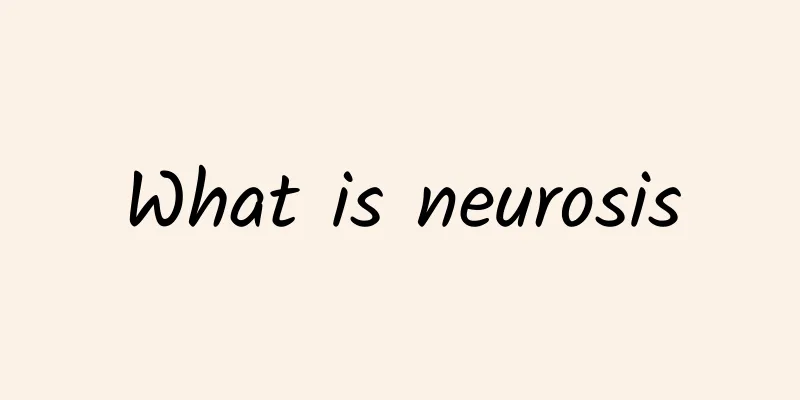What is neurosis

|
Neurosis is a very common mental illness with many symptoms. Many people do not know what neurosis is and are unable to detect symptoms in time when they have them. There are many causes of neurosis, and mental causes and genetic factors are very common. Patients are prone to abnormal emotional reactions, and some slight stimuli can cause symptoms. If everyone can learn more about the symptoms of neurosis in their daily lives, they can also make self-diagnosis in time. If you want to understand what neurosis is, you must first start by understanding the symptoms of neurosis. This disease is also a very complicated disease. Symptoms and signs of neurosis Traditional neurosis is divided into many diagnoses due to its prominent symptoms. In my country, the diagnosis of neurosis includes the following diseases (or syndromes): 1. Phobic neurosis: also known as phobia, fear disorder, is a neurosis with phobia symptoms as the main clinical manifestation. The specific thing or situation feared is external, although there is no danger at the time. The phobic attack is often accompanied by significant autonomic nervous system symptoms. The patient tries his best to avoid the feared situation. He himself knows that the fear is excessive, inappropriate or unreasonable, but it cannot prevent the phobic attack. 2. Anxiety neurosis: also known as anxiety neurosis, it is characterized by generalized anxiety disorder (chronic anxiety disorder) and paroxysmal panic state (acute anxiety disorder) as the main clinical manifestations, often accompanied by dizziness, chest tightness, palpitations, dyspnea, dry mouth, frequent urination, urgency, sweating, tremors and motor restlessness. The anxiety is not caused by actual threats, or the degree of tension and panic is very disproportionate to the actual situation. 3. Obsessive-compulsive neurosis: OCD for short, is characterized by repeated and persistent obsessive thoughts and/or compulsive actions as the main symptoms. These symptoms come from the patient's heart but are not experienced or produced voluntarily. Instead, the patient is unwilling to think about them. He knows that they are unreasonable but cannot get rid of them, which makes the patient feel painful and is incompatible with his own personality. 4. Depressive neurosis: also known as neurotic depression, is a neurosis caused by social and psychological factors, characterized by a persistent low mood, often accompanied by anxiety, physical discomfort and sleep disorders. Patients have treatment requirements, but no obvious motor inhibition or psychotic symptoms, and their life is not seriously affected. It is a neurosis characterized by a persistent low mood, often accompanied by anxiety, physical discomfort and sleep disorders. Patients have treatment requirements, but no obvious motor depression or psychotic symptoms, and their ability to live is not seriously affected. This disease is commonly known as "bad mood" internationally. 5. Hysteria: The original annotation of the word hysteria is "a disease of the mind", also known as hysteria. It is a common neurosis, more common in rural areas. It is currently believed that hysterical patients have personality traits such as susceptibility to suggestion, exaggeration, emotionality and high self-centeredness. The disease is often caused by mental factors or bad suggestions, and may present various clinical symptoms, such as sensory and motor disorders, visceral organ and autonomic nervous system dysfunction and mental abnormalities. These symptoms have no basis in organic damage. They can be caused by suggestions, and can also change or disappear due to suggestions. 6. Hypochondriasis: also known as hypochondriasis, refers to a neurosis in which a person makes an unrealistic and morbid interpretation of his or her own feelings or symptoms, causing the whole mind and body to be occupied by the resulting doubts, worries and fears. It is characterized by excessive concern for one's own health and difficult-to-eliminate prejudices. Patients suspect that they have a disease that does not actually exist, and the doctor's explanation and objective examination are not enough to eliminate their views. 7. Neurasthenia: Neurasthenia refers to the weakening of mental activity due to excessive tension in brain function activities caused by certain long-standing mental factors. Its main clinical characteristics are easy excitability and easy fatigue, often accompanied by various physical discomforts and sleep disorders. Many patients have certain susceptible qualities or bad personalities before the onset of the disease. 8. Other neuroses. The common points are: ① the onset of the disease is often related to constitution and psychosocial factors; ② there is a certain personality foundation, and the patients often feel that they cannot control the consciousness or behavior that should be controllable; ③ the clinical phase presents a variety of mental and physical symptoms, but without the corresponding organic basis; ④ the patients are generally conscious, have good contact with reality, have an intact personality, and have no serious behavioral disorders; ⑤ the course of the disease is long, the self-awareness is intact, and they require treatment. The above introduction is about what neurosis is. Please check yourself to see if you are suffering from this disease. If you have similar symptoms, you should go to the hospital for examination in time. If you suffer from neurosis, don't be anxious or panic. You should choose the treatment method that suits you under the doctor's advice. |
<<: How long after tooth extraction can you brush your teeth?
>>: What are the symptoms of enteritis and diarrhea?
Recommend
What is the cause of cough and low fever?
Cough and low fever are common in life, and there...
Why does it hurt when I press my cheek bone?
People are very familiar with their physical heal...
How to quickly reduce swelling of thrombosed hemorrhoids
Thrombosed hemorrhoids are a relatively common ex...
Massage techniques for baby's night cough
Some babies often cry and cough at night because ...
How to improve poor psychological quality
Poor psychological quality is a common psychologi...
What to do if your calf muscles become tight while running
Some people find that their calf muscles are tigh...
What are the dangers and treatments of ankylosing spondylitis?
Ankylosing spondylitis is a very common chronic i...
Orange steamed water for cough
Orange steamed water can cure cough. First of all...
What is the best lactation drug?
Although living standards are getting better and ...
What are the antipruritic ointments for children?
Children with skin allergies and eczema are prone...
How can massage help slim down your legs?
Nowadays, Korean fashion not only brings visual e...
Remove mosquito bite scars
Summer not only has annoying high temperatures, b...
Can people with gout eat pig skin?
For friends with gout, you should pay special att...
How to stop bleeding after tooth extraction
There will be a small amount of bleeding after to...
Health tips for the beginning of autumn
As the hot summer fades away and autumn arrives, ...









